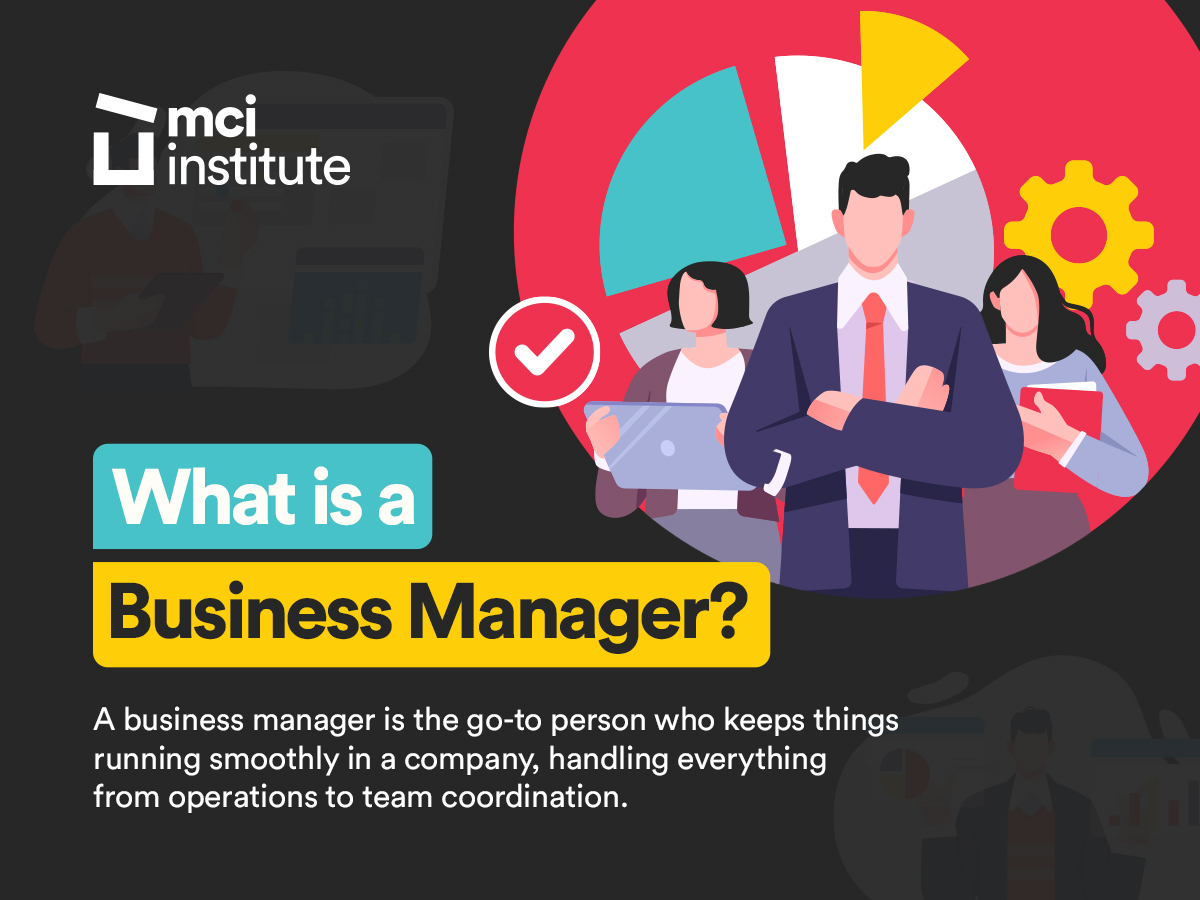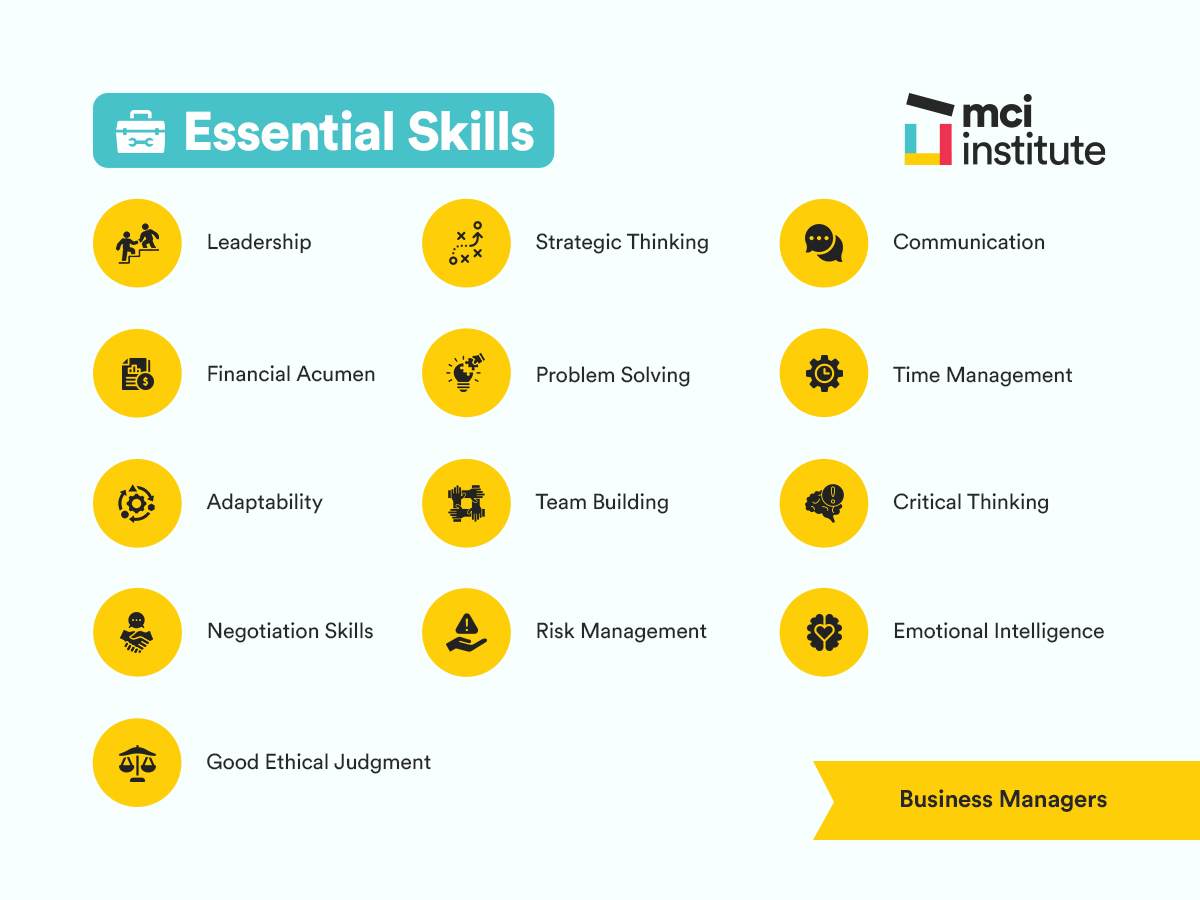In the dynamic world of modern businesses, the role of a business manager is indispensable.
A business manager serves as the backbone of any organisation, seamlessly integrating various departments and ensuring that the company's goals are met efficiently and effectively. Whether it's driving financial planning, leading team development, or fostering customer relationships, their role is crucial in maintaining the harmony and progress of the business landscape.
Understanding the multifaceted responsibilities and acquiring the right set of skills are the first steps in carving out a successful career as a business manager -- so let's dive in.
What is a business manager?

A business manager is a multifaceted professional responsible for the overall management and success of a business. This role encompasses a wide range of activities and responsibilities, which can vary depending on the size of the organisation.
At its core, the position requires a unique combination of strategic planning, operational oversight, and people management.
Key responsibilities of a business manager
A business manager combines strategic insight with operational expertise and effective leadership. They must be skilled in a variety of areas across the business, from finance and operations to people management and customer relations.
Strategic planning and decision-making
Business managers play a crucial role in setting the strategic direction of the company. They analyse marketing trends, identify opportunities for growth, and develop long-term plans to achieve business objectives.
Responsibilities include:
- Analysing current market conditions and predicting future trends to inform strategic direction
- Identifying growth opportunities
- Developing long-term plans
- Resource allocation
- Responding to competitive challenges
Financial management
A critical part of the role involves managing the organisation's financial health. Business managers often work closely with the financial team to analyse financial reports, plan for future expenditures, and make decisions that affect the company's bottom line.
Responsibilities include:
- Planning and allocating financial resources, or advising the financial team
- Forecasting future financial performance and requirements
- Implementing cost control measures
- Managing profitability and financial health
- Working with the financial team to analyse reports and inform decision-making
Operations management
Business managers are responsible for ensuring that the day-to-day operations of the business run smoothly. This can include overseeing production, managing supply chains, and ensuring quality control.
Responsibilities include:
- Managing the production process to ensure efficiency and quality
- Overseeing the supply chain to ensure timely and cost-effective delivery of products
- Quality control
- Optimising processes
People management
Managing people is a big part of the role, if not the biggest. Leadership skills are essential, as they must inspire and motivate their teams to achieve business goals.
Responsibilities include:
- Helping with recruitment and training
- Setting performance standards and evaluating employee performance
- Identifying and facilitating opportunities for staff growth and development
- Creating a positive and productive work environment
- Leading and motivating teams to achieve business goals
Customer and client relations
In many organisations, business managers also play a role in managing relationships with customers and clients.
Responsibilities include:
- Handling negotiations with clients or customers
- Addressing and resolving issues raised by clients
- Ensuring high levels of customer satisfaction to maintain loyalty
- Developing and maintaining strong relationships with clients and customers
Adaptability and problem-solving
The business environment is dynamic, and business managers must be able to adapt to changing circumstances. They're often called upon to solve complex problems, manage crises, and make quick decisions under pressure.
Responsibilities include:
- Adapting strategies and operations in response to changing business environments
- Addressing and resolving unexpected business crises
- Making quick and effective decisions in high-pressure situations
Compliance and risk management
Ensuring that the business complies with all legal and regulatory requirements is another important aspect of the role. Business managers must understand the legal context in which the company operates and manage risks to the business.
Responsibilities include:
- Legal compliance
- Staying informed about the legal environment affecting the business
- Risk assessment and management

Why become a business manager?
Becoming a business manager can be both professionally fulfilling and personally rewarding. Here's why.
- Career advancement opportunities: business management roles often lead to higher positions within an organisation, offering a clear path for career growth
- Diverse skill development: this role provides the opportunity for you to develop a diverse skill set, including strategic planning, financial management, leadership, and problem-solving – making you a well-rounded professional
- Financial rewards: business managers typically earn competitive salaries and may also receive bonuses and other performance-related benefits
- Leadership experience: managing a team or department allows you to develop and refine your leadership abilities – valuable skills in any career path
- Networking opportunities: as a business manager, you'll have the chance to network with other professionals within and outside your industry, which can open up new opportunities and insights
- Impact on business success: playing a key role in driving a company's success can be incredibly rewarding. You'll have a direct impact on your business's performance, strategy, and direction
- Problem-solving challenges: the role of a business manager offers a dynamic work environment with a variety of challenges that keep the job interesting and engaging
- Learning and growth: as a business manager, you'll be exposed to continuous learning opportunities, whether through formal training, workshops, or on-the-job experiences.
- Influence on organisation's culture: you'll have the ability to shape and influence the company's culture, fostering a positive work environment and contributing to employee satisfaction.
- Autonomy and decision-making power: business managers often enjoy a degree of autonomy, allowing them to make decisions and steer the ship
- Exposure to different business areas: this role can provide exposure to various parts of the business, from marketing and sales to finance and operations, giving you a comprehensive view of how businesses operate
Essential business management skills

Business management is a broad role, which means you need to have or acquire a range of different skills and competencies.
- Leadership: the ability to inspire, motivate, and guide others is fundamental. Effective leadership involves setting clear goals, providing direction, and fostering a positive work environment.
- Strategic thinking: this involves the ability to see the big picture, anticipate future trends and challenges, and devise long-term plans to achieve organisational objectives.
- Communication skills: essential for conveying ideas clearly, listening to others, and facilitating open and effective dialogue among team members and stakeholders.
- Financial acumen: understanding financial statements, budgeting, financial forecasting, and managing resources efficiently is crucial for making informed decisions that affect the bottom line.
- Problem-solving and decision-making: the ability to analyse situations, identify problems, and develop effective solutions is critical. This also involves making decisions, sometimes under pressure, that can have significant impacts on the organisation.
- Time management and organisation: effective time management and the ability to organise tasks and priorities are both essential for managing multiple projects and meeting deadlines.
- Adaptability and flexibility: the business environment is constantly changing, so being able to adapt strategies and approaches to new situations is key.
- Team building and development: building, managing, and nurturing a team is essential. This includes hiring the right people, developing their skills, and creating a team culture that aligns with organisational goals.
- Negotiation skills: whether dealing with suppliers, clients, or team members, the ability to negotiate effectively can lead to better outcomes for the organisation.
- Critical thinking: this involves analysing facts, understanding logical connections, and approaching problems in a systematic way to make sound business decisions.
- Customer and client management: understanding and meeting the needs of customers and clients is critical for the success of any business.
- Risk management: identifying and mitigating risks to prevent potential issues that could harm the organisation or its objectives is crucial.
- Emotional intelligence: the ability to understand and manage your own emotions, as well as recognise and influence the emotions of others, is vital in managing a team effectively.
- Project management: skills in planning, executing, and overseeing projects to ensure they are completed efficiently and effectively.
- Ethical judgment and integrity: upholding strong ethical standards and integrity in decision-making fosters trust and a positive reputation for both you and the organisation.
Pathways to becoming a business manager
To become a business manager, you'll likely need a tertiary qualification and have some extensive experience under your belt.
- Formal qualification. You might do this through a Bachelor's degree in Business Administration, Commerce, Management, or a related field. You might also consider postgraduate study, like a Master's degree in a management discipline.
- Vocational Education Training (VET). A Diploma or Certificate course in business management is a great step towards becoming a business manager.
- Work experience. Starting in entry-level positions in business or related fields and working your way up can be a practical approach. You may then have opportunities for internal promotion within your organisation.
- Professional development. If you've worked in a business field for a while, courses and workshops focused on specific management skills or areas of business can enhance your resume and provide practical knowledge. There are also a number of industry certifications and online learning you can do to grow your skills further.
Business manager salary

A business manager's salary can vary depending on the industry you work in and the type of company you work for.
As a business manager in Australia, you can expect to earn between $100K-$135K annually.
Business manager resume tips
Creating a resume as a business manager requires showcasing your leadership experience, business acumen, and success in managing operations and teams. Here are a few things you should consider including:
- Showcase leadership experience. Show the impact you've had in these positions, and include examples of successful team management, problem-solving, and decision-making.
- Highlight strategic planning skills. The strategic planning and execution of business plans is a big part of business management; detail any successful projects or initiatives you've led, especially those that contributed significantly to your company's success.
- Focus on financial management. Financial acumen is essential; include any experience you have with budgeting, financial planning, cost reduction, and even profit and loss management.
- Detail operational management experience. Have you managed any areas of operations, like supply chain, production, or sales operations? Did you create improvements or find success in these areas? Detail it!
- Demonstrate problem-solving abilities. Potential employers need to know you can manage issues as they arise, so give examples of any complex challenges you've faced and the innovative or effective solutions you implemented.
Business manager interview questions
If you're interviewing for a business management position, it pays to be well-prepared and have an idea of the types of questions you'll be asked in your interview. Consider prepping a few answers in your head so you're ready to go when asked about them during the interview. We've listed a few potential questions below, but make sure you do your own research too!
- What is your approach to strategic planning? (Prepare examples)
- How do you motivate and lead a team?
- Describe a challenging situation you faced as a manager or leader; how did you handle it?
- How do you manage underperforming team members?
- How do you stay updated with industry trends and market changes?
- What is your approach to client or customer relationship management?
- Give an example of a successful project you managed.
- How do you approach risk management in business?
Take the next step in your business management career
If you're ready to take on your career as a business manager but need some help refining your skills or upskilling further, our online Certificate IV in Business is the perfect way to strengthen your foundation. Explore our range of nationally recognised online business management courses and get started today!
Excited to showcase the role of a business manager on your website? Go ahead and embed this infographic with ease! Just copy and paste the HTML code provided below into your site's code, and you're all set to share this insightful visual with your audience.

.png?width=113&name=MCIinstitute_RGB_Color_Black-01%20(2).png)


